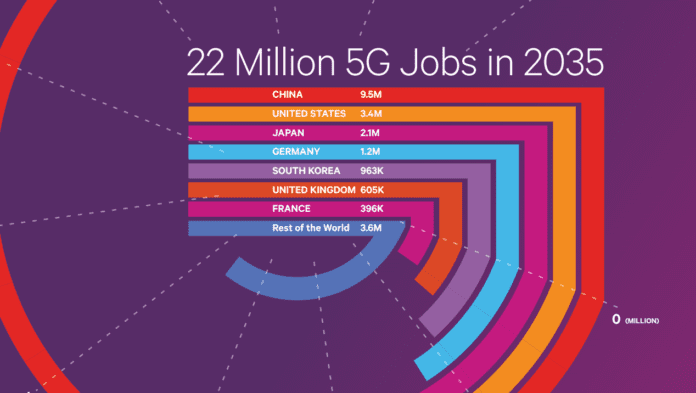New research commissioned by Qualcomm suggests the broad commercialization of “5G” mobile technology will have the same impact on global order as the printing press, electricity, the steam engine, the telegraph and the internet.
Produced by IHS Markit, Penn Schoen Berland and the Berkeley Research Group, the report authors label 5G as a general purpose technology, something that can “profoundly [change] industries and economies.” Just as Gutenberg’s printing press, invented around 1440, helped usher in the Renaissance by making mass-production of books possible, 5G is set to change the global economy.
Some key report finding include the 5G value chain will invest $200 billion annually; by 2035, 5G will enable $12.3 trillion of global economic output; and from 2020 to 2035, the total contribution of 5G to real global gross domestic product will be equivalent to an economy the size of India.
The report details three broad use cases: enhanced mobile broadband that will support extended range, particularly into buildings, as well as support for more devices; mission critical services that require high throughput and low latency; and massive “internet of things.”
Speaking to job creation, the authors predict there will be 22 million 5G-related jobs by 2035. Broken down, that’s 9.5 million jobs in China, 3.4 million jobs in the U.S., 2.1 million jobs in Japan, 1.2 million jobs in Germany, 963,000 jobs in South Korea, 605,000 jobs in the United Kingdom, 396,000 jobs in France and 3.6 million jobs in the rest of the world.
Based on a survey conducted with the research, 91% of respondents expect the next generation of mobile to bring new products and services to market that have yet to be invented; 89% expect increased productivity; 88% expect new industries to emerge; and 85% expect small business growth and more global competition.
Per the report, “IHS Markit views 5G as the focal development that will put mobile technology solidly into the realm of GPTs. The planned advancements for 5G are expected to explicitly address an incredibly diverse set of use cases. The widening diffusion across industries and processes where wireless currently has limited penetration will position mobile technologies for a deep and sustained impact across a broad range of sectors and geographies.”

